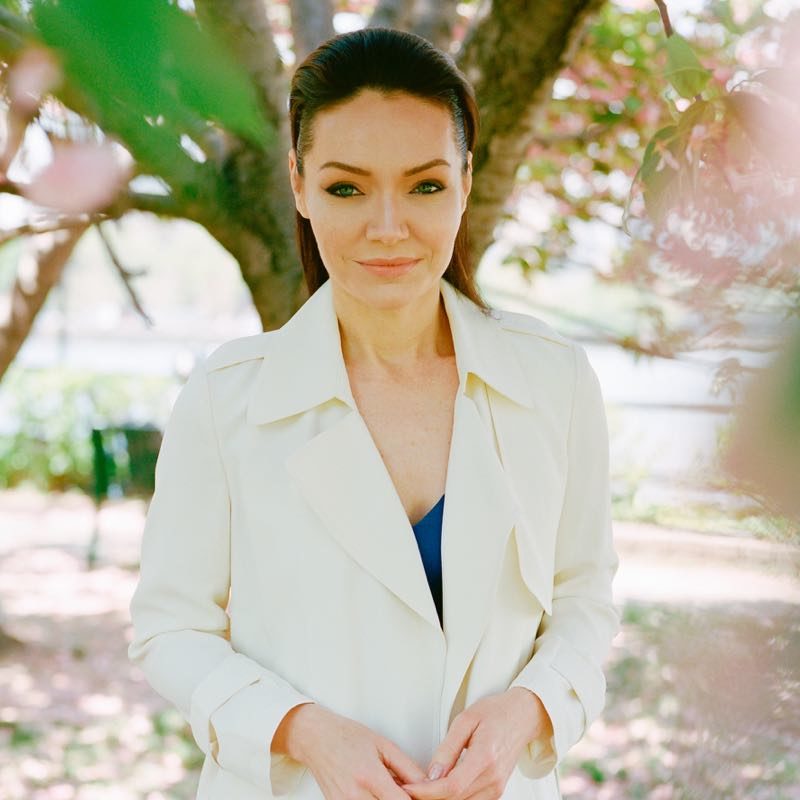An Interview with Katrina Lenk
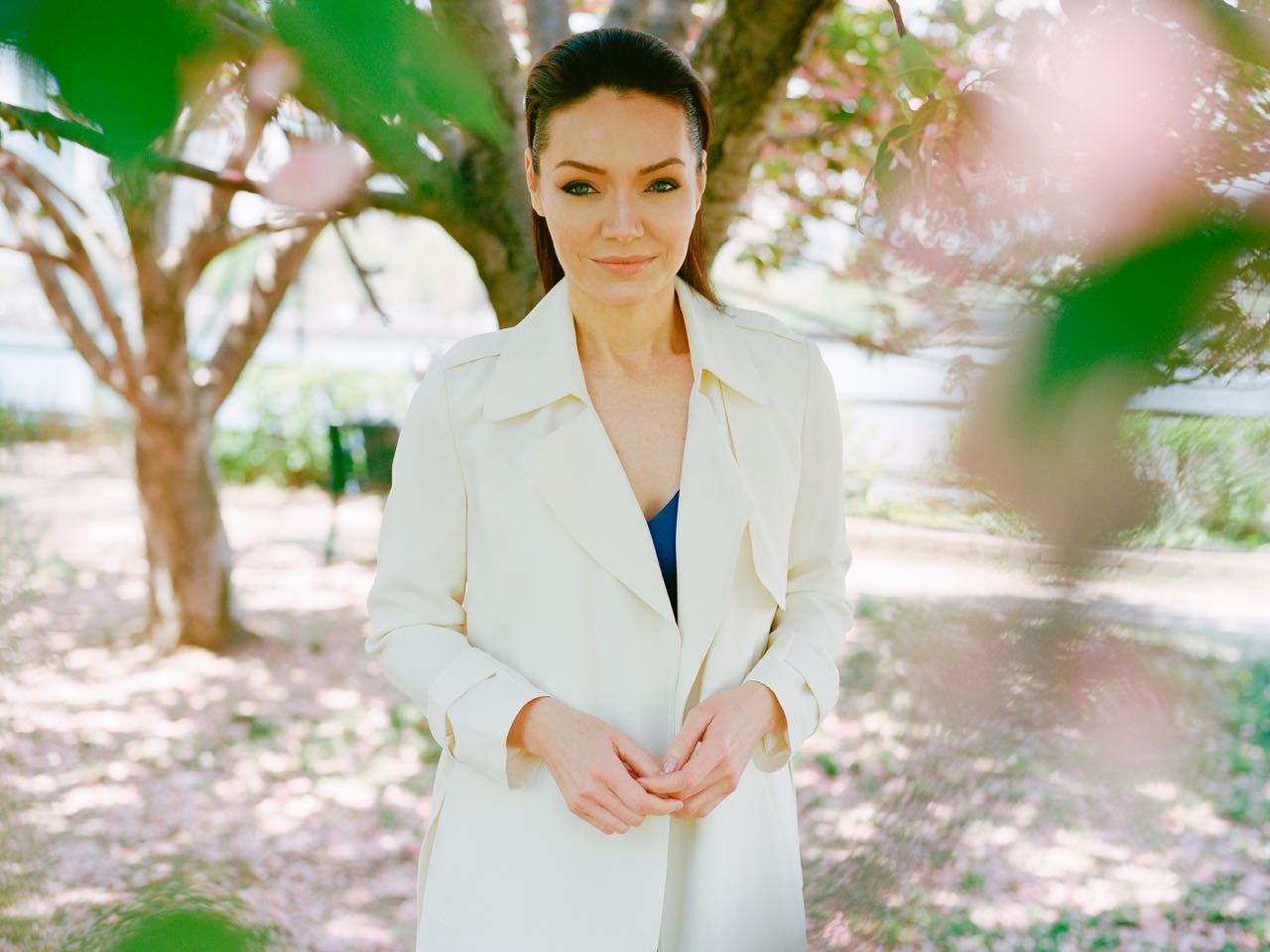
Written by Victoria Myers
Photography by Jacqueline Harriet
May 22nd, 2018
A few years ago, I came across an old interview with Israeli writer Amos Oz in The Paris Review. At one point, while speaking about how writers are viewed differently in different cultures, he mentions that the word “fiction” only exists in Hebrew as a way to translate the English word; what Americans refer to as fiction, Israelis refer to as narrative prose. This might not seem to be of terrible significance, but, if you think about it, it’s pretty mind blowing. How do different cultures organize themselves ideologically? And how do we tell stories about ourselves and about others?
In the last few years, the actress Katrina Lenk has become a growing sensation in the theatre by playing women from other cultures. First in Indecent, and then as Dina, an Israeli café owner, in The Band’s Visit, for which she received a 2018 Tony Award nomination for Best Actress in a Musical. For Dina, she also received glowing, if at times slightly exoticized reviews, and a sudden public interest developed in “Who is Katrina Lenk and where did she come from?” There were profiles; a video of her playing a fiddle and singing “If I Were a Rich Man” at MCC’s Miscast Gala went viral. Yet, still not a lot remains known about her. She is from Illinois and went to Northwestern; plays music; worked for years before getting her, as they say, “big break”; she is “unique,” whatever that means. So, who is Katrina Lenk and where did she come from? Well, maybe the more apt question is what does our fascination with her tell us about ourselves?
I recently sat down with her to talk about how the stories we tell affect our worldview, her process for creating Dina, being a private person, and her dream to one day be a female James Bond.
One of the things that I’ve talked to a few actresses about is how it’s a whole other process to learn how to handle all the outside demands of doing a show and getting to awards season, where you’re like, “My day is completely booked up and that doesn’t even include doing this show.” How have you been handling all of that?
Thank goodness I have a great team to help me out because everyone says this time is crazy, but you don’t really understand what that means until you’re in the middle of it going, “Oh, right.” It’s a learning process. I don’t know if I can answer that question for sure of how I’ve been doing it, but you just get up and you go. Also, it’s really exciting that people are excited about the show and want to talk about it. As much as it’s a busy time, it’s really wonderful that people are interested in the show. It’s a good thing.
Going way back when the show was Off-Broadway at Atlantic and starting rehearsals, what was your way into the character?
In the audition process, I took a look at the movie, just to get a sense of the world in which the story takes place and get a sense of the characters. But I fell in love with the movie so fast that I was like, “Okay, I can’t keep watching this movie because I’m just going to want to copy everything that Ronit Elkabetz, who plays Dina in the movie, was doing.” She’s an amazing actress, so a lot of inspiration came from there. Also, doing a lot of reading. I got obsessed with some Israeli fiction and watching Israeli indie films. There’s so many available now on the internet, and it’s wonderful to get access to all these movies that maybe ten years ago you wouldn’t have been able to see. All to get a sense of what it’s like to live there. Also, talking with friends from Israel and asking them what it’s like. We were introduced to this Israeli dance movement philosophy called Gaga by our choreographer there named Lee Sher, who’s an amazing woman and Israeli. I spent a lot of time with her figuring out how to be in Dina’s body. Also, I was listening to a lot of Israeli music. It was a lot of pulling information from all kinds of areas. But it was, first, read as much as you can about Israel and as much as you can about the women that live there and get as much access as I could to people who’ve had similar experiences to anyone that’s in the story and just asking questions, questions, questions.
When you were doing all that research and reading, and finding out about Israel and the culture, when you got into the rehearsal room, did you feel like you were specific in the way you were trying to incorporate that? Or did you do all the reading and then left it alone and just saw how it came out?
More of the latter, I think. You read things, or you see things, or you hear things, and you never know how it is going to wind up informing moments in the piece. Little things will get triggered and pop up while we’re doing the show now that are informed by something I read last year or something someone had told me. I suppose it goes from being a super intellectual thing to then being, when you’re in the rehearsal room, just an instinctual thing. But then there are also definitely moments where it was a specific discussion between the director and the writer and me, [asking] what’s happening here and what is this referring to? The Gaga movement was so helpful because it was a way of helping turn all of the intellectual stuff into not only mentally intuitive, but physically instinctual and intuitive ways of being in the character. It’s a way of connecting your brain and your heart and your body in a way that was so super, super helpful.
Did you look for ways the character is like you and things like that?
I don’t know if I necessarily work that way so much. I’m more interested in ways that we are not the same. There are things about her that I love and I love them because they are different from me—qualities about her that are inspiring or that I wish I had. It was more like, “What things do I like about this person,” rather than, “How are we different” or “How are we the same.”
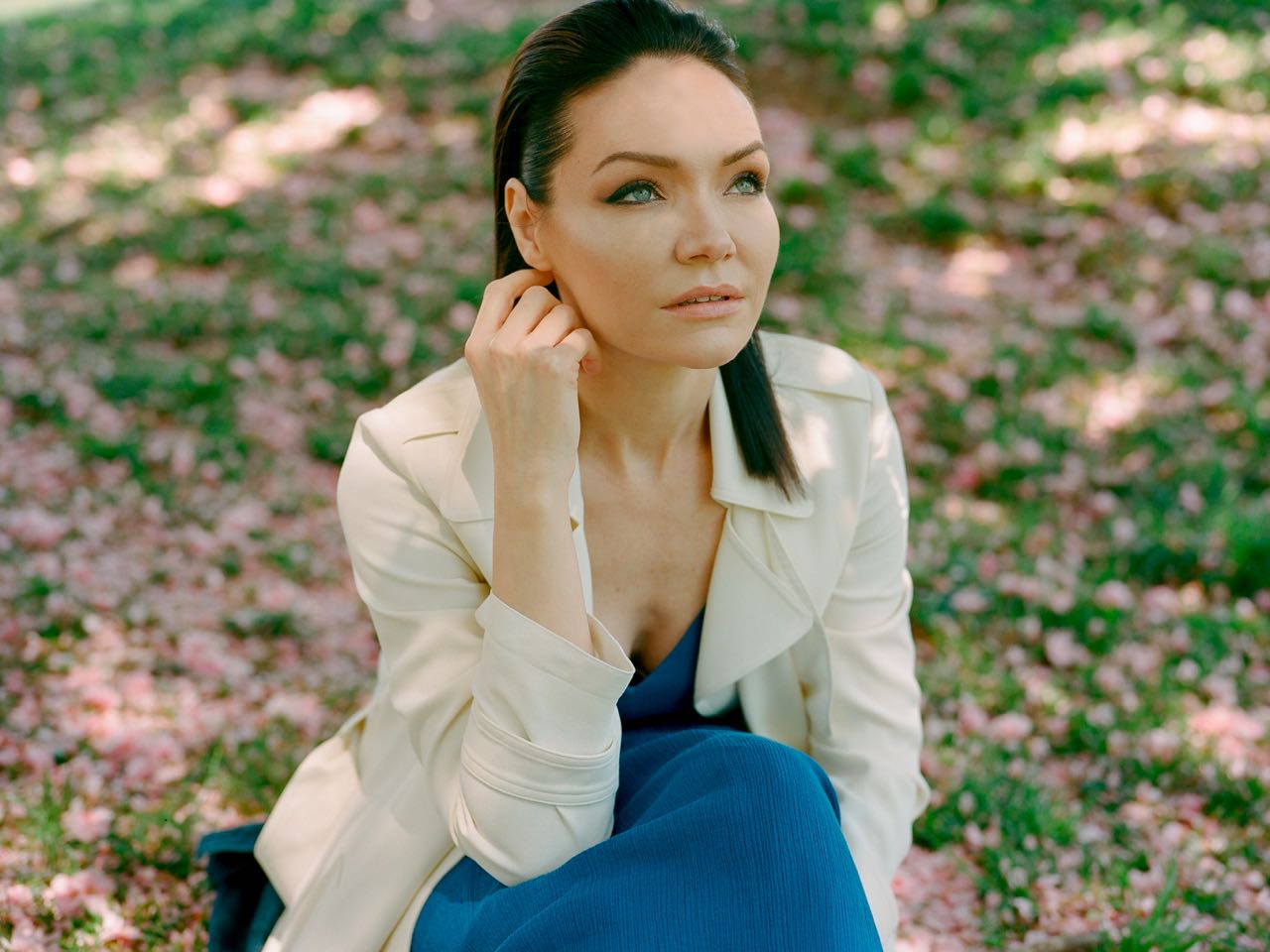
One of the things that I thought was impressive is that you’re playing somebody from a different nationality and a different culture that has a different worldview and different way of relating to people. It’s not just being American in a different climate. I was wondering if you could talk a little bit more about how you went about that?
Regardless of what culture someone comes from, they’re a human being. Any time you’re playing a character that’s different from you, there are things that you’re going to have in common. Number one that you’re a human being, so there are basic human things you want—love, compassion, to be understood. Also, feelings of loneliness or need. I approached it more that way. And having a deep respect and love for this culture that now I know more about than I knew before.
I tried to get a sense of what’s the folklore, what stories are being told. We can learn a lot from the contemporary fiction that’s coming out of the culture. Things that capture the imagination of someone are also really informative to what’s important to them and what needs they have. Yes, the cultures are different, and yet not, because it’s still people and people have similarities. We come from different cultural backgrounds, but fundamentally though, we are human beings, we are women, and there are things that every human being and every woman can understand about each other no matter what.
What fiction did you read?
It was Etgar Keret, especially. He’s an Israeli writer and he writes this absurdist sort of dark humor, short stories, generally. There was something about the tone of his writing that was reminding me a lot of the tone of this story we’re telling. There’s a lot of dealing with the sense of nothing’s happening and you’re going out of your skin, however, that’s just what it is, and so you deal with it. It’s this really fascinating juxtaposition of feeling bored but also feeling antsy. Then having a [shrug] attitude about it. The Israeli “it is what it is” thing, and you deal with things as they come, and have a sardonic sense of humor about it. His writing is very much like that. Also Shani Boianjiu’s novel about women in the army [The People of Forever Are Not Afraid], which is also really fascinating. I don’t have any experience with that and what that’s like. That book was really helpful in understanding what it’s like to be in that position and then what that does to you psychologically and emotionally. I think [IDF service] is always in the background in Dina’s experience because all the women have to serve in the army over there, and that’s so different from what we have to do here as Americans.
The fiction thing and the whole idea of the mythology that different cultures tell themselves is fascinating.
Yes, it’s like a mythology, and you can learn a lot about a contemporary culture from it, I think. Thinking about how we grew up and the stories we were told by our parents—all those fairy tales, or the folklore—that gets in your psychology and it’s there your whole life. You’re not even aware of the Cinderella story or Snow White, or Sleeping Beauty [and the idea of] getting rescued, and how much that informed you growing up. So to find in a different culture what stories their kids are told growing up or what they talk about, give a little clue into the psychology, I think.
Did you make up a whole backstory for Dina and what her mythology is for herself?
Yes. What’s great about it is that no one knows, and I have the power to change it if I want. There are some days if it’s feeling a little different, I can change the story a little bit, and that’s a fun game and keeps it interesting, too.
Did you find something about the character that surprised you? Or something where you were like, “I totally think it’s this. I totally think this is her thing,” or this is something about her that I feel really sure of,” and then, as you went along or got into performances, you were like, “Oh, I was wrong. This is actually something else”?
At the end of the show, there’s a choice that she makes, that when I saw it in the movie, it’s dealt with in a different way. Same result, but you don’t see the choice happening. Here, we show the choice happening on stage. I was baffled by why she would do this, and I couldn’t wrap my head around it for a long time. We all sat down one day, and I was like, “Can we just talk this out because I don’t understand why she does this.” Figuring that out was definitely a moment where I was like, “Oh.”
That is a place where I feel we would differ if Katrina and Dina were in the same choice. But maybe not now, now that I understand it, maybe not, but it was definitely a moment of an eye opening, “Oh, this is the person based on this action.” But it was definitely a mystery for a while. When I finally figured it out, it was like, “Oh. Okay. I get you now.”
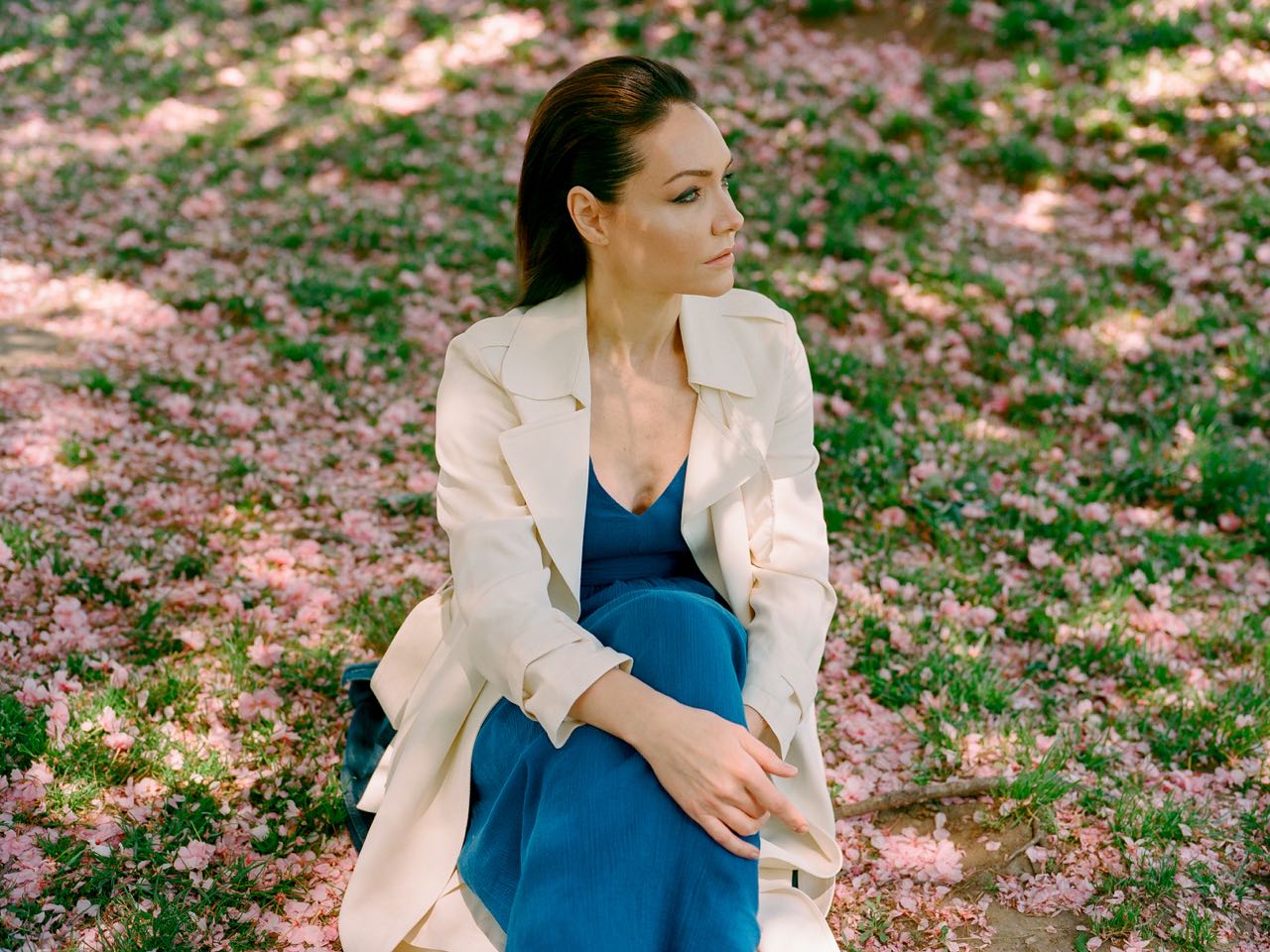
The gender dynamics are interesting in the show. For the most part, the women don’t really interact with each other on stage. They’re all in worlds of men.
Yes, except for Sharone Sayegh and Rachel Prather’s characters. They’re always together, but in general, yes. And it’s mostly men on stage, also.
Was that interesting to you as part of the role and part of the show? In thinking about the performance—and this goes back to what we’ve been talking about—did you think about how there are some cultural differences and how that might read on stage? Like women there serve in the IDF and all of that, and, this is a generalization, but Israelis are maybe more forward than Americans are used to, things like that.
I definitely noticed it, and I think because the creative team is predominantly men, as well, as a woman, you get used to there being men around all the time, and that’s how it is. I was really happy that Dina and Tewfiq are basically equals throughout the show—that she’s in charge of this town, and he’s in charge of that town. The feeling of equality there, I think, is different than here, because they have to serve. Women and men serve side by side in the army and everyone has to do it. From the women that I’ve met who have lived in Israel and served, there’s definitely a sense that’s different than what we have here. I feel we tend to apologize, in a way, for being where we are. There I feel like the women are like, “What? I’m here and I’m a woman, and so what?” That’s a leap that I think we have to make here. I think that’s reflected in the story—yes, we’re women, but so what? That’s not a big deal. You know what women can do and we don’t need to prove ourselves to you—which I really love.
When I was doing research on you, I noticed that there aren’t a lot of facts about you out there. Is that by choice on your part of keeping your life and background more private?
Yes, I think I’m generally a private person, and there’s some things that are just for me and for people that I know.
Has it been strange to have to be doing press and talking about yourself?
It is strange. I’m definitely not used to it. I’m also not used to people having an interest, so it’s been a strange thing to get used to and to navigate. It’s not like all of a sudden I’m a private person. I’ve always been a private sort of introverted type of person. It’s a weird thing to have anyone ask me questions. It’s a thing I’m still not quite used to.
What was the first piece of storytelling that had a major impact on you?
There was this book called The Stolen Telesm that I was obsessed with as a kid. There was something about this story. I don’t even remember what happens anymore, but I think there was a Pegasus involved. In the story, the kid goes outside their life and goes and steps into another story and gets to participate in that story. Something about that really sparked my imagination—the idea of stepping out of your own life and going into someone else’s life and participating in that, or understanding that. Stepping in that other person’s shoes and actually understanding what their lives are like really captured my imagination so much. Maybe it was one of the things that led me to being an actor—getting to tell stories and understand other people’s stories. I loved that book so much that I still have it. It was in storage for a really long time, and I just got all my shit out of storage, and there’s The Stolen Telesm with the little hard cover with the little bookmark in it.
What did your childhood bedroom look like?
Oh my God, it was pink. It was pink, and it was a mess. Just a mess. I always got in trouble because I did not clean my room. Pink. Pink bedspread, pink walls. I had a big framed poster of Baryshnikov. I was obsessed. I still am obsessed with Baryshnikov. His dancing is the perfect fusion of technique and soul and heart. Just astounding. I had a big poster of him in my room. And a picture of a sad clown. Just this beautiful, sad harlequin. I’d be like, “I understand that you’re sad, harlequin. I’m sad, too.” And my pink walls. Like a dork.
Were you one of those kids who was interested in adulthood, and not so much childhood?
No. I think I was so excited and into all of the lessons I was doing. I was taking a million lessons. I was going to dance classes, and taking viola lessons, and singing lessons, and doing theatre. I was a nerdy, dorky, straight-A student, so there was so much in my daily life that was really exciting and frustrating and challenging that I wasn’t thinking like, “Oh, I can’t wait until I’m an adult.” Except maybe to stop doing homework. I was just so busy with all the creative stuff. I was also obsessed with Prince. Obsessed. Not because he was a sexy guy, but his orchestrations and his musicality were just phenomenal, so I was obsessed with him. Then practicing the viola and going to dance class, and doing homework.
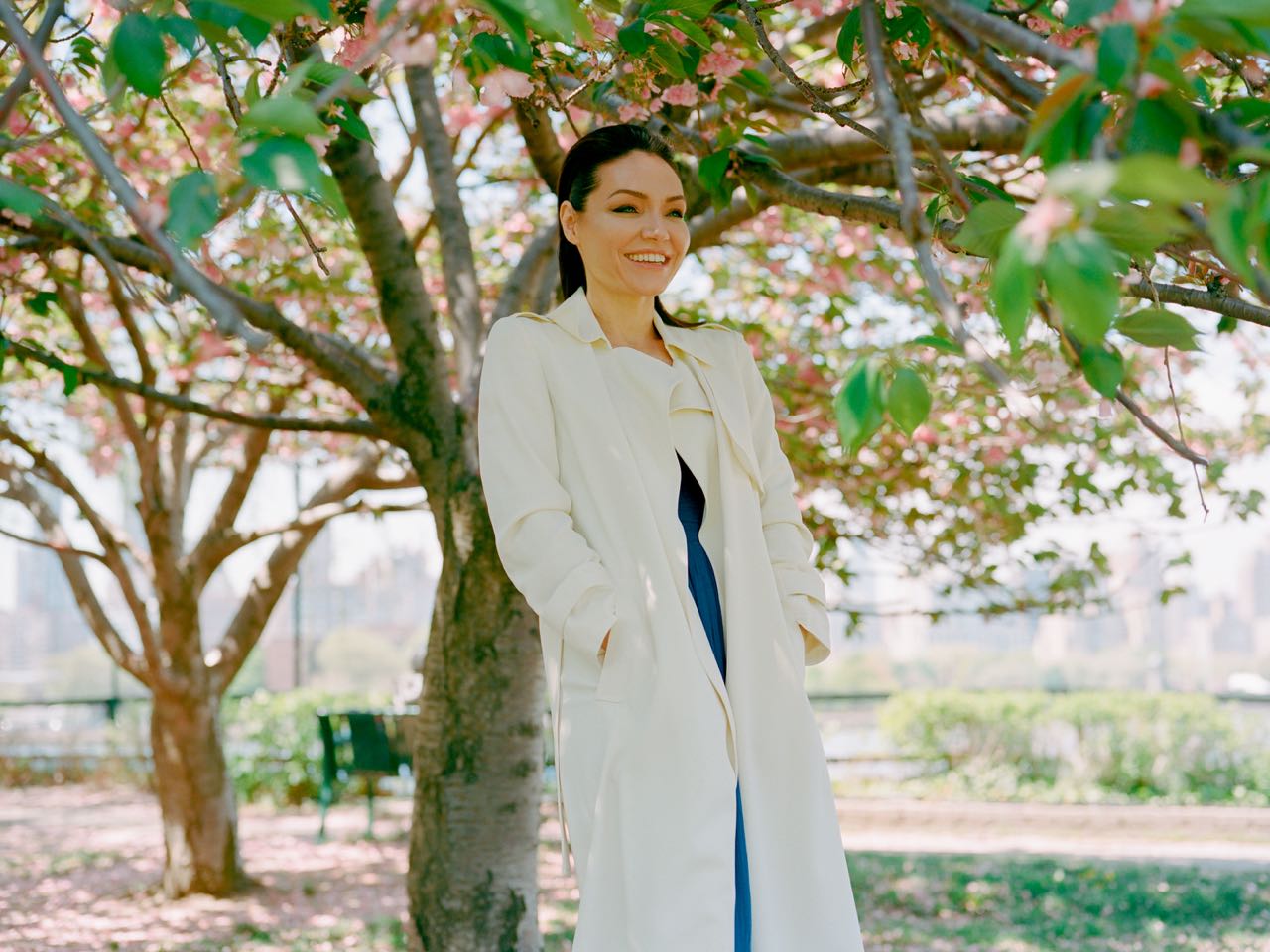
In other interviews, there’s been a focus on how you have a background that’s eclectic in the sense of you did a lot of stuff like music and dance. Something I ask actresses a lot is how, over the course of their careers and their lives, being in an industry that’s known for typecasting people and putting people in a box affects them. How do you feel all of that affected you in your creative path and your development as a creative human being?
I think I didn’t have that particular misfortune because I spent a lot of time not getting work. I didn’t often have someone saying, “Don’t do that other thing because that will confuse people.” I think there was a lot of, “We don’t know what to do with you.” So that gave me a lot of time to keep doing what I wanted because there was no one to say, “Don’t do that.” Because there was nothing happening.
Also, I think because I wanted to do TV and film, and the place that I was at and the timing, led to just doing more and more theatre and musicals, and musicals tend to be more embracing of multiple talents anyway, because you generally have to sing and dance, and hopefully act. I think because there was already multiple talents were encouraged in that way, no one cared that I played the viola. That didn’t affect them at all.
Do you feel like when you were younger, like right out of school, that there’s a pressure to narrow it down?
No. I think I was so weird that I was just a weird person. I think there was a lot of, “We don’t know what to cast you as.” Rather than being typecast, there was a, “We don’t know what you are.” So I’ll go over there and do some things. Although, right out of college, I got cast in a production of Cabaret as Sally Bowles. I could not believe it. She’s kind of a weird, atypical character. I think then I was like, “Oh, so there is room for me somewhere and it’s just maybe more these kinds of characters.”
Right now, does it feel like pressure to capitalize on everything, or pressure with all the attention on you?
No. I think I have a really good team that’s good at keeping a lot of that away. But it’s my own mental pressure of finding brain space and energy to focus on the show. There’s more stuff happening that wants to take up the mental time. The most important thing right now is doing this show and doing this show the best that I can. That’s the number one priority. I have to keep reminding myself of that, because it feels like two jobs happening at once.
What’s your personal relationship like with ambition? Do you consider yourself ambitious?
I don’t know. I look at ambitious people and I go, “I wish I was more like that.” However, I guess I can’t say that I’m not ambitious because I’ve never stopped trying to work. I just want to work, and I want to do things that inspire me and give me something to think about and challenge me. Is that ambition? I don’t know. Ambition, to me, generally means someone who just wants to climb to the top. I don’t know that that’s the priority for me. It’s just, I want to keep working and I want to keep doing the thing that I love doing. I don’t know if that qualifies as ambition or just I fucking love what I’m doing.
Do you have a spiritual life and does it affect your work?
You mean like, do I practice a religion or anything like that? Is that what you mean?
Yeah, anything in that area.
No. I don’t know what’s out there. I have no idea. I don’t know that I have a necessarily spiritual life, but I know that I want to be a good person, and I want other people to be good people. Why, I don’t know. What happens after you die, I have no idea. I wish I knew. I wish someone would tell me.
Going back to what we were talking about earlier about the mythologies people come up with. Now with being in the spotlight, do you feel there’s something people have gotten wrong, or something where it’s like, “Oh, everybody now thinks this about me, but it’s actually not true.” What do you feel is the story of yourself in this moment?
I can’t answer that fully because I tend to not read the interviews. I don’t want to read about myself. Sometimes, when I do, when I have read something I’ll be like, “Why the hell did I say that? Oh my God.” Also, it seems like caring about it too much can be a mind game. But this is still all so new for me that I don’t know. Does it really matter? I don’t know.
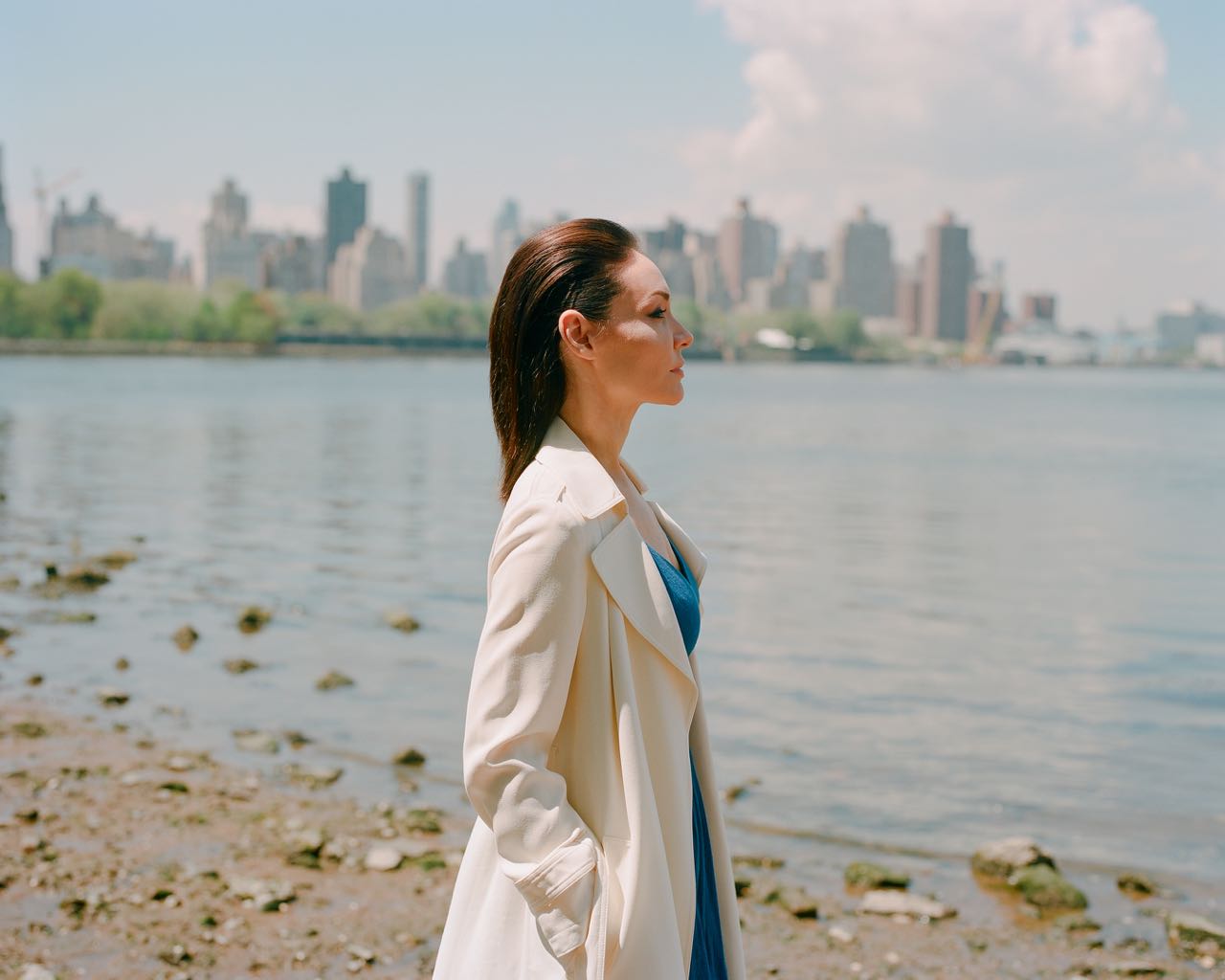
Professionally, what are your hopes and dreams for the next few years?
I would really like to survive to see July. That’s hope and dream number one. Then it just seems like there’s just static noise, like empty white noise. It feels weird to think about beyond this because this is so all-consuming—wonderfully all-consuming right now, because I love doing this show and I love everything about this show. I’d love to work on my own ideas I have for some things. I have some story ideas that I’d like to get to work on. Also, I really get excited by working and collaborating with people on new work, so I’m hoping that there’ll be more new exciting projects in the future. To get to be in some action films would be really fun. I really want to be in an action film.
Really?
Yes. I grew up watching James Bond and had dreams of one day being James Bond. Just something like running, or maybe riding a horse. Or doing a crazy stunt. Saving the day. You know, as you do.

